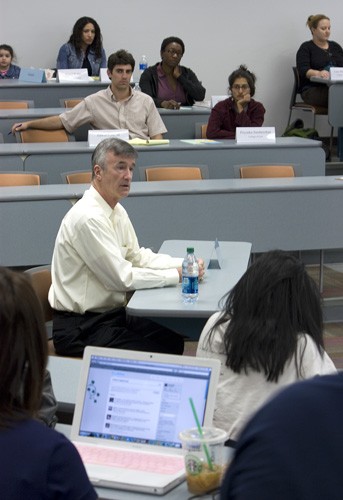The UA Graduate and Professional Student Council held a special meeting with President Robert Shelton on Wednesday to address some of the graduate students’ concerns.
The first item discussed was the ongoing debate around Arizona’s Proposition 100, the one-cent sales tax increase that current Arizona Gov. Jan Brewer proposed last year. The bill, which would repeal itself automatically in 2013, promises that 66 percent of funds raised by the tax would go to fund education.
According to Shelton, the UA’s share of those funds would amount to more than $41 million.
“”Forty-one million dollars is a big number,”” Shelton said. “”To put that in context, we receive only two sources of state funds of that magnitude, salaries and financial aid.””
Though Shelton did not officially give his support to the bill, he did outline the consequences should Proposition 100 fail.
“”I can’t get the word out on the university letterhead, but I will speak to the facts of the matter,”” Shelton said. “”As you all know, we’re down to the bone and beyond already. This is literally a referendum on education in Arizona, both for universities and K-12.””
Shelton also addressed the council’s concerns about the Arizona Board of Regent’s recent directive to cut general fund expenditures on salaries by 2.75 percent, or about $5.3 million for next year.
“”Some of this, we can accomplish through natural attrition, people retiring or leaving to take jobs elsewhere,”” Shelton said. “”The rest we can accomplish by one-time furloughs, even though I hate that f-word. It may be a way to comply with the one-time directive.””
Shelton also stressed that the regents have not finalized the details of the proposal.
GPSC secretary-treasurer Cory Christenson asked Shelton what the university’s plans were for 2012, when money from the federal stimulus plan will run out.
“”So far the best proposal I’ve heard from the administration seems to be ‘good luck, hope you graduate before then,'”” Christenson, a physics graduate student, said.
Shelton agreed, but stated that the university has several contingency plans in place to deal with what many expect to be sharp cuts.
“”The challenge isn’t figuring out the numbers, that’s a mathematical and spreadsheet process,”” Shelton said. “”The real challenge is figuring out the impact. The most difficult part of leadership in these times is giving people hope.””








